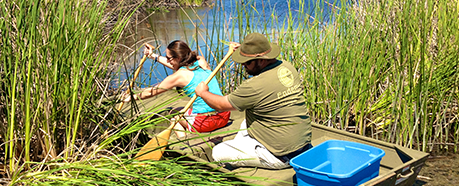Southern California has only one native freshwater turtle, the southwestern pond turtle. These turtles live mostly in wetland habitats including ponds, streams, rivers, and lakes. Unfortunately, in southern California, 97% of our wetlands have been lost due to agricultural, urban development, and water diversion. Due to this extreme habitat loss, populations of our only native turtle have suffered greatly. However, in comparison to many other species on the brink, there hasn’t been a great effort to conserve and understand this species- a lot more research needs to be done on this species to fully understand them. It is imperative that habitat is preserved and restored for these unique species, which would benefit an entire ecosystem. For these reasons, it is one of ICRE’s goal to not only to conduct research with these species, but restore habitat, and spread the word about this amazing species before it’s too late! We continue to survey and assess known populations so that then we can determine if there are viable populations that can be protected and their habitat enhanced. Through our Species of Special Concern Recovery Program, ICRE will also utilize young scientists and local college students as interns to train them as up and coming conservationists.
Southwestern Pond Turtle Research


Fairview Park Restoration

Biologists working for ICRE have successfully restored 50 acres of natural habitat at Fairview Park in Costa Mesa, CA, the City’s only nature park. However, there is still over 100 acres of potential habitat that can be restored. Our habitat restoration efforts have been successful in establishing native vegetation, which has attracted many rare bird species.
Fairview Park is a beautiful place for park enthusiasts such as walkers, joggers, and birders. In addition to the wildlife habitat the park provides, the site also provides water quality improvement and treatment for Orange County. The created wetlands on site are designed to filter runoff water, naturally metabolizing excess nutrients and pollutants ,as well as, replenishing ground water. This form of water filtration allows for an ecosystem to provide a service naturally.

With the areas surrounding the restored area still degraded, there is much more potential habitat that can be enhanced. In order to continue improving our community and establishing wildlife populations of our local species, the restoration of this space needs to continue! ICRE is focusing on an additional 5 acres of heavily degraded coastal sage scrub habitat. It is saturated with non-native plant species that choke out the beautiful native habitat that is the home for the federally-listed California Gnatcatcher. With financial support, this area would be kick started into establishing more pristine habitat.
Upper Newport Bay Restoration

ICRE has partnered with a California Coastal Commission project in Upper Newport Bay- the Community Based Restoration and Education Program. ICRE works year round with this program and its volunteers to help restore Newport Back Bay, a site that is home to a huge diversity of local wildlife. Come out and join the fun on the fourth saturday of every month, or join us for our steward days on wednesdays! We are happy to have as many volunteers as we can get. For more info, or to sign up to get info about volunteering, visit the program website.
Sea Turtle Conservation
To assist Tortugueros Las Playitas in their conservation efforts, ICRE has taken expeditions down to Baja to help record and study several sea turtle species including the green sea turtle, olive ridley’s, and leatherbacks, all of which are endangered and threatened and can use all the support they can get! ICRE’s biologists also incorporate education with their work with Tortugueros Las Playitas by helping to teach local kids about environmental consciousness and marine biology. Want to know more about how you can help? Check out Tortugueros Las Playitas or feel free to contact ICRE’s biologists about their experiences at Melissa.Ward@ICREglobal.org


